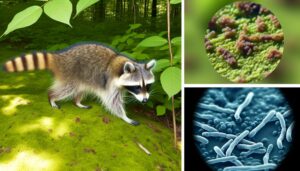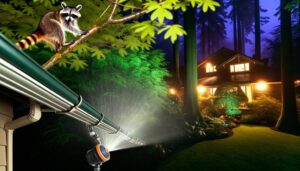How You Can Legally Have a Pet Raccoon – Step-by-Step Guide
Owning a pet raccoon is subject to strict legal regulations and permits, varying by state. Raccoons require specific housing, high-quality nutrition, and extensive veterinary care.
Their behavior includes natural instincts that can pose safety concerns. Socialization and training are challenging due to their intelligence and independence.
Financial burdens include veterinary bills, specialized diets, and compliance with legal requirements. Ethically, potential owners must consider the complexities of keeping a wild animal in captivity.
There are alternatives, such as domesticated pets, that might better suit most households. Explore further to understand the extensive responsibilities and commitment involved in owning a raccoon.

Key Takeaways
- Check local and state laws, as having a pet raccoon often requires specific permits and adherence to wildlife regulations.
- Raccoons need specialized care, including secure housing, a balanced diet, and regular veterinary visits.
- Early socialization and training are crucial, but raccoons remain independent and can exhibit challenging natural behaviors.
- Keeping a raccoon as a pet can be costly due to veterinary bills, diet, housing, and permit fees.
- Consider alternative pets which are easier to care for and legally straightforward, like dogs, cats, or small mammals.
Legal Considerations
Before deciding to keep a raccoon as a pet, it is imperative to thoroughly understand the relevant legal regulations and restrictions in your jurisdiction. Raccoons, classified often as wild animals, are subject to specific laws due to their potential to carry zoonotic diseases and impact local ecosystems. Ethical considerations must be taken into account, as their natural behaviors and needs may not be adequately met in a domestic setting.
From a clinical perspective, the health and welfare of both the raccoon and humans interacting with it must be prioritized. Ensuring compliance with regional wildlife conservation laws not only protects the animal but also upholds public safety and environmental integrity. Understanding these legal frameworks is essential for responsible pet ownership.
Licensing and Permits
Understanding the intricacies of licensing and permits for pet raccoons is essential for compliance with state-specific regulations. The application process typically involves detailed steps to guarantee the animal's well-being and public safety, requiring thorough documentation and, often, a home inspection.
Additionally, permit holders must adhere to renewal requirements to maintain legal ownership, reflecting a commitment to ongoing responsibility and ethical care.
State-Specific Regulations
Browsing the intricate landscape of state-specific regulations for owning a pet raccoon requires a thorough understanding of the licensing and permit requirements unique to each jurisdiction. These guidelines, often rooted in ethical and ecological considerations, vary significantly across states.
For example:
- Prohibited States: Some states, such as California and Georgia, outright ban the ownership of raccoons as pets.
- Permitted with Conditions: States like Florida and Indiana may allow raccoon ownership but require specific permits and adherence to strict conditions.
- Health and Welfare Checks: In states like Ohio, periodic veterinary checks and welfare inspections are mandatory.
- Public Safety Concerns: States like Texas impose regulations to ensure the raccoons do not pose a public health risk.
Understanding these nuances is crucial for responsible pet ownership.
Application Process Steps
Understanding the application process for obtaining the necessary licenses and permits to own a pet raccoon involves a series of meticulously defined steps tailored to each state's regulatory framework. These steps typically include a thorough background check, submission of detailed housing plans, and proof of veterinary care. Each step ensures prospective owners can provide a safe and ethical environment for the raccoon. Below is an illustrative table summarizing key steps in the application process:
| Step | Description |
|---|---|
| Background Check | Criminal history and previous animal ownership |
| Housing Plan | Detailed layout and safety measures |
| Veterinary Proof | Documentation of a vet's willingness to provide care |
| Application Submission | Completing and submitting state-specific forms |
Adhering to these steps highlights the commitment to ethical pet ownership.
Permit Renewal Requirements
Renewing a permit to keep a pet raccoon involves following strict regulatory requirements. This process safeguards the welfare of the raccoon and the safety of the community. Often, requirements include updated background checks, veterinary reports, and compliance with housing standards.
To effectively renew your permit, consider the following essential steps:
- Submit Updated Background Checks: Confirming that the owner remains suitable to care for a raccoon.
- Provide Current Veterinary Reports: Documenting the raccoon's health status and vaccination records.
- Verify Housing Compliance: Ensuring the living environment meets regulatory standards for space, cleanliness, and safety.
- Complete Continuing Education: Demonstrating ongoing dedication to proper raccoon care practices.
These measures demonstrate a commitment to ethical animal stewardship and public safety.
Raccoon Behavior
Raccoons exhibit complex behaviors that reflect their high intelligence, adaptability, and curiosity, which can present unique challenges and rewards for pet owners. These nocturnal creatures are known for their dexterous front paws, enabling them to manipulate objects and solve puzzles, often leading to mischief in a household setting.
Their social structures in the wild suggest that they require substantial mental stimulation and interaction to prevent boredom and destructive tendencies. Ethically, potential owners must recognize the significance of catering to these behavioral needs to guarantee the raccoon's well-being.
Clinically, it is vital to understand that improper handling or lack of enrichment can lead to stress and behavioral issues. Therefore, informed care is essential for maintaining a raccoon's physical and mental health.
Housing Needs
When considering the housing needs of a pet raccoon, it is important to provide a suitable living space that accommodates their physical and behavioral requirements.
The choice between indoor and outdoor housing must be evaluated based on the raccoon's well-being, safety, and security, ensuring an environment that prevents escape and minimizes stress.
Ethical considerations involve creating a habitat that respects the raccoon's natural instincts while promoting a healthy and enriching lifestyle.
Suitable Living Space
Ensuring an appropriate living space for a pet raccoon necessitates careful consideration of their physical and psychological needs to promote their well-being. A raccoon's habitat should be spacious and enriched to prevent stress and behavioral issues. Key elements of a suitable environment include:
- Space: Ample room for climbing, exploring, and exercising to maintain physical health.
- Enrichment: Varied stimuli such as toys, puzzles, and interactive feeders to keep their intelligent minds engaged.
- Safety: Secure enclosures free from hazards to prevent injury and escape.
- Comfort: Areas for resting and hiding to fulfill their need for security and relaxation.
Providing a thoughtfully designed living space is essential in ensuring the ethical care of a pet raccoon, reflecting a commitment to their holistic well-being.
Indoor Vs. Outdoor
Determining whether to house a pet raccoon indoors or outdoors requires a thorough evaluation of their unique needs and the potential risks and benefits associated with each environment. Raccoons have complex behavioral, social, and environmental requirements that must be met to ensure their well-being. Indoor housing offers protection from predators and environmental extremes but may limit their natural exploratory behaviors. Conversely, outdoor housing provides a more stimulating natural habitat but increases exposure to risks such as disease and escape.
| Aspect | Indoor Housing | Outdoor Housing |
|---|---|---|
| Safety | High, controlled environment | Moderate, risk from predators |
| Space | Limited, requires enrichment | Ample, natural habitat |
| Health | Easier monitoring | Increased disease exposure |
| Enrichment | Requires creative solutions | Natural stimuli available |
| Ethical Considerations | Constrained natural behavior | Better for natural behaviors |
Selecting the appropriate housing involves balancing these factors to best serve the raccoon's holistic needs.
Safety and Security
A critical aspect of housing pet raccoons involves implementing robust safety and security measures to protect both the animal and the household. Raccoons are intelligent and curious creatures that require secure environments to prevent escape and injury.
Essential steps include:
- Secure Enclosures: Guarantee enclosures are escape-proof with sturdy locks.
- Safe Space: Provide a safe, raccoon-proof area within the home to prevent access to harmful substances or fragile items.
- Regular Inspections: Conduct frequent inspections of the living space to identify and address potential hazards.
- Emergency Protocols: Establish emergency protocols for potential escapes or injuries.
Adhering to these guidelines guarantees the raccoon's well-being and minimizes risks, reflecting a commitment to ethical and responsible pet ownership.
Diet and Nutrition
Proper diet and nutrition are crucial to maintaining the health and well-being of a pet raccoon. This requires a balanced mix of proteins, fats, carbohydrates, vitamins, and minerals. Raccoons are omnivorous, thus their diet should include a variety of foods such as lean meats, fruits, vegetables, and high-quality commercial raccoon food.
Proteins are essential for muscle development, while fats provide necessary energy. Additionally, fruits and vegetables supply essential vitamins and antioxidants. Avoiding foods with high sugar and salt content is important to prevent health issues. Ethical considerations also involve sourcing food responsibly to promote sustainable practices.
Health and Veterinary Care
Ensuring the health and well-being of a pet raccoon requires attention to common health concerns such as parasitic infections and metabolic disorders.
Locating a veterinarian with expertise in exotic animals is vital for appropriate diagnosis and treatment.
Additionally, adhering to a vaccination and preventive care regimen is essential for mitigating the risk of transmissible diseases and maintaining overall health.
Common Health Concerns
Managing the common health concerns of pet raccoons requires a thorough understanding of their unique veterinary needs and potential health risks. As compassionate caregivers, it is crucial to be vigilant about the following issues:
- Parasitic Infections: Raccoons are prone to various parasites, including roundworms and fleas, which can affect both the animal and human handlers.
- Nutritional Deficiencies: Securing a balanced diet is essential to prevent malnutrition and related diseases.
- Zoonotic Diseases: Raccoons can transmit diseases like rabies and leptospirosis, necessitating regular vaccinations and health monitoring.
- Behavioral Stress: Captivity can induce stress-related health problems, requiring environmental enrichment and behavioral interventions.
Addressing these concerns with expert veterinary care and ethical consideration secures the well-being of both raccoons and their human companions.
Finding Specialized Veterinarians
Locating veterinarians with specialized knowledge in exotic pet care, particularly those experienced with raccoons, is fundamental to addressing their unique health needs and ensuring best care. These professionals possess the expertise required to diagnose and treat conditions that are uncommon in more traditional pets.
Ethical considerations mandate that raccoon owners seek out qualified practitioners who can provide advanced medical interventions and tailored wellness plans. Finding such specialists often involves consulting directories of exotic animal veterinarians, seeking referrals from wildlife rehabilitation centers, and exploring academic institutions with veterinary programs.
Equally important is establishing a relationship with a veterinarian who emphasizes the ethical treatment and welfare of raccoons, ensuring that their complex medical and behavioral needs are met with compassion and professionalism.
Vaccination and Preventive Care
Maintaining a thorough vaccination and preventive care schedule is vital to safeguarding the health and well-being of pet raccoons. Ensuring raccoons receive vaccinations against common diseases protects not only the animal but also the household and community.
Veterinary professionals recommend the following preventive measures:
- Rabies Vaccination: Essential to prevent this fatal disease, which poses significant public health risks.
- Canine Distemper Vaccine: Important, as raccoons are highly susceptible to this often deadly virus.
- Regular Parasite Control: Routine treatments for fleas, ticks, and intestinal parasites to prevent zoonotic transmission.
- Annual Health Checks: Thorough examinations to detect and address potential health issues early.
Adhering to these guidelines reflects a commitment to ethical pet ownership and the broader responsibility of public health stewardship.
Socialization
Effective socialization is essential for ensuring that a pet raccoon adapts well to domestic life and interacts safely with humans and other animals. Early exposure to various environments, people, and controlled interactions with other animals is critical. This process requires a systematic approach, emphasizing positive reinforcement to foster trust and reduce anxiety.
Clinically, poor socialization can lead to behavioral issues such as aggression or fearfulness, complicating human-animal interactions.
Ethically, owners must consider the raccoon's natural behaviors and needs, ensuring they are met to promote well-being. This includes understanding their nocturnal nature and providing appropriate outlets for their curiosity and physical activity.
Proper socialization not only benefits the raccoon but also mitigates potential risks to humans and other pets.
Training Challenges
Training a pet raccoon presents unique challenges due to their highly intelligent and independent nature, necessitating a thorough understanding of their behavioral tendencies and motivational triggers. From an expert perspective, working with raccoons requires patience, consistency, and an ethical commitment to their well-being. Clinically, it is essential to recognize that raccoons are not domesticated animals and may exhibit unpredictable behaviors.
Here are key emotional and practical considerations:
- Patience: Training can be time-consuming and requires significant effort.
- Consistency: Raccoons need a structured environment to learn effectively.
- Ethical obligations: Ensuring their training methods are humane and stress-free.
- Understanding natural instincts: Acknowledging their natural tendencies can guide more effective training strategies.
These factors highlight the complexity of integrating raccoons into domestic settings.
Safety Concerns
Addressing safety concerns is paramount when keeping a pet raccoon, given their potential for aggressive behavior and the zoonotic diseases they can carry. Raccoons are naturally wild animals, and even well-trained ones may exhibit unpredictable aggression. Additionally, they can transmit diseases such as rabies, leptospirosis, and raccoon roundworm, posing significant health risks to humans and other pets.
| Safety Concern | Risk Level | Preventive Measure |
|---|---|---|
| Aggressive Behavior | High | Secure enclosures, constant supervision |
| Rabies | Very High | Vaccination, regular vet checks |
| Leptospirosis | Moderate | Hygiene, avoid contact with urine |
| Raccoon Roundworm | High | Regular deworming, sanitation |
Ethically, one must consider if the home environment can safely accommodate the unique needs of a raccoon without compromising the well-being of all involved.
Financial Costs
Beyond the imperative safety measures, potential pet raccoon owners must also be prepared for the significant financial costs associated with their care. The expenses can be substantial and multi-faceted, encompassing both initial and ongoing commitments.
- Veterinary Bills: Raccoons require routine check-ups and vaccinations, which can be costly due to their exotic status.
- Specialized Diet: A balanced diet for a raccoon includes high-quality proteins, fruits, and vegetables, necessitating ongoing expenditure.
- Housing and Enrichment: Creating a secure and stimulating environment involves investment in enclosures and enrichment toys.
- Legal and Permit Fees: Depending on local regulations, securing the necessary permits and adhering to legal requirements can incur additional costs.
These financial obligations necessitate careful consideration and ethical commitment to the well-being of the animal.
Alternative Pets
Considering the complexities and challenges of keeping a pet raccoon, prospective pet owners might explore alternative pets that offer companionship with fewer legal and financial burdens. Domesticated animals such as dogs and cats provide reliable companionship and emotional support, while being widely accepted within urban and suburban settings.
Small mammals like guinea pigs or hamsters demand minimal space and care, making them suitable for apartment living. Birds, especially species like parakeets or canaries, offer interactive engagement and are generally easier to manage regarding care and habitat requirements.
Ethically, choosing a pet that thrives in captivity and has established veterinary care protocols ensures that both the animal's welfare and the owner's responsibilities are effectively balanced, fostering a harmonious human-animal bond.
Conclusion
The acquisition of a raccoon as a companion animal necessitates a thorough examination of numerous factors, including legal mandates, behavioral characteristics, and substantial financial commitments.
The inherent unpredictability and specialized care requirements of raccoons present considerable challenges. Consequently, it is imperative to deliberate on the ethical and practical implications of such an undertaking.
Prospective caretakers should explore alternative pets that may offer more predictable behaviors and fewer legal complications, thereby ensuring a more harmonious human-animal relationship.






